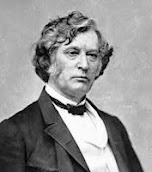Sebastián Delgado, University of Cambridge, has posted The Utopian Liberal: Continuity and Change in the Thought of Charles Sumner, which also appeared in The Docket’s series, “A Focus on Undergraduate Scholarship, which aims to spotlight outstanding legal history projects being done by undergraduate students.”
--Dan ErnstCharles Sumner cannot be accused of having an unwarranted consideration for the virtues of consistency. The New Englander Sumner of the 1840s advocated for sectionalist interests so long as they provided a strong counter to the Southern warmongering and slave-owning desires, while the nationalist Sumner of the 1850s championed the federal government as far as it committed itself to limiting slavery’s growth and then eradicating it. The strict constructionist Sumner of 1855 advocated for a narrow construction of the Constitution in discrediting the Fugitive Slave Act, while the Sumner of the 1860s and 1870s demanded an elastic construction for carrying out Reconstruction and ensuring equal rights.
Charles Sumner (LC)
Despite these swings in his interpretive philosophy and party switches, Sumner’s thought was consistent, founded on an integral idealism that remained constant despite politics’ vicissitudes. “His partisanship … served as a means to advance moral ends."
